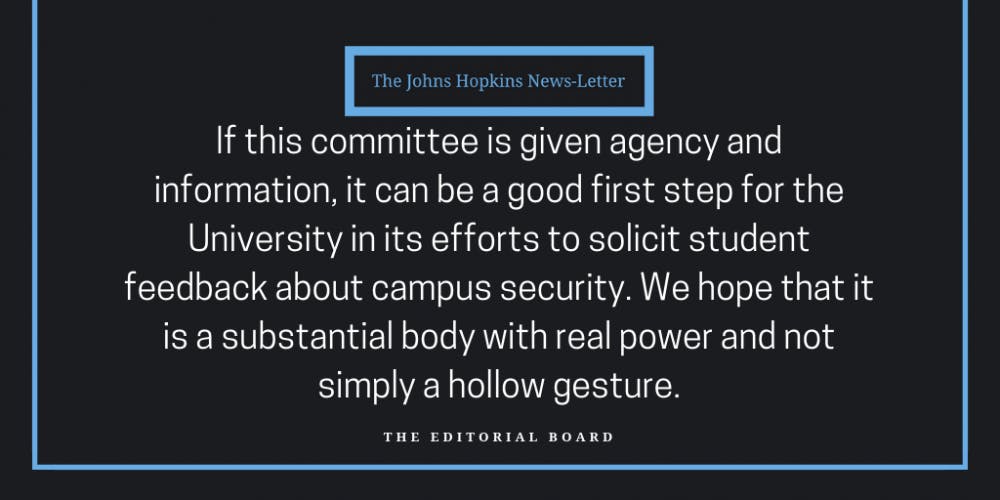University officials surprised students on March 5 when they announced support for a bill that would enable the creation of a private police force for Hopkins. Though some students supported the initiative, the bill angered and confused many students. The University had provided few specifics as to the nature of the police force, and had failed to collect student input prior to the announcement.
After pushback from the Hopkins and Baltimore community, administrators released another statement on March 30 announcing they would be withdrawing the bill from the legislation. In an email to students, faculty and staff, University President Ronald J. Daniels and Hopkins Medicine CEO Paul B. Rothman stated that the bill would undergo further consideration and be moved into an interim study. This would ensure that the University could “continue important conversations about building a sworn police force that models the best in constitutional, community-based policing.”
Over the last six months, we’ve waited patiently for those conversations to occur.
This past week, the University announced the creation of a Student Advisory Committee for Security, which will include 15 students from across different Hopkins campuses. Ten of the representatives will be selected from predetermined student groups, and the last five students will be at-large members selected by Vice President of Security Melissa Hyatt in consultation with Vice Provost for Student Affairs Kevin Shollenberger.
We often call on the University to include students in decision-making processes and to create opportunities for students to voice their opinions. The committee presents an opportunity for the University to do both, if executed well. But it must accurately reflect student voices. It must have the ability to effect change. It must be informed, and it must be transparent.
Our reporters asked Hyatt what a diverse committee would look like and how a diverse committee would be selected. Though Hyatt explained that she is looking for students with diverse perspectives and who represent the different campuses, no specifics have been provided as to how Hyatt and Shollenberger will ensure the committee is diverse and represents all the opinions of the Hopkins student body. It is also hard to believe that the committee can fully represent the nine divisions of the University by only having one or two members from each campus.
Even assuming the committee is representative, members will not be able to have substantial discussions on Hopkins security if they are not informed. Since the start of July, The News-Letter has attempted to set up interviews with University officials regarding the private police force and the University’s outreach efforts. Despite repeated requests, our reporters have received responses postponing interviews to future dates for months. How can we know that the members of the committee will be supplied with the necessary information when that information is not accessible?
Assuming the committee does get the information they need to have productive conversations and make informed decisions, Hopkins must be held accountable to implement the committee’s suggestions. The University cannot disregard the committee’s views and ideas when making decisions about security.
Finally, the discussions and decisions of the community and of the University must be made transparent to the student body as a whole. The committee should be representative of the student body, and the only way that can happen is if the students have an opportunity to talk to their representatives about the issues discussed.
Even if all of these issues are adequately dealt with, the lack of student input was just one of many mistakes University officials made when first announcing their support for a private police force. Another major problem was the lack of community input.
This new committee does not give community members who would be impacted by the private police force a voice or a seat at the table. Baltimore residents who live in the neighborhoods surrounding our campuses must be included in the discussion. Whether it is a membership spot on this committee or a separate committee of community members, substantial steps towards gathering feedback from Baltimoreans in surrounding neighborhoods has to occur.
If this committee is given agency and information, it can be a good first step for the University in its efforts to solicit student feedback about campus security. We hope that it is a substantial body with real power and not simply a hollow gesture. It is up to the University to ensure that happens.





